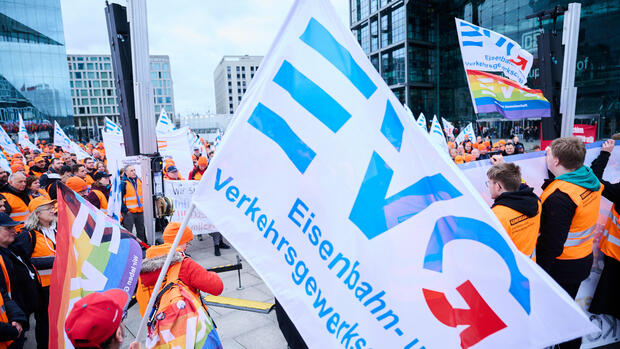The union has been negotiating higher wages with dozens of rail companies since late February.
(Photo: dpa)
Fulda, Frankfurt An indefinite strike is threatening Deutsche Bahn in the coming days and weeks. Collective bargaining between the federally owned group and the railway and transport union (EVG) failed. This was announced by the union on Wednesday evening in Berlin. “Against the background of the demands decided at the time in Fulda, the term of 27 months was rated as clearly too long and the wage increase offered as too low and too late,” the union said. The federal executive board of the EVG will decide on how to proceed on Thursday in Berlin. If the EVG should call for work stoppages, they should do so a few days in advance.
A labor dispute would, among other things, upset the plans of many travelers in North Rhine-Westphalia. The summer holidays there begin this Thursday. The EVG represents 180,000 employees at the state-owned company. A strike would have massive consequences and would largely paralyze operations.
Since Deutsche Bahn also manages the rail network, competitors such as Flixtrain are likely to be adversely affected. If, for example, signal boxes are not manned, nothing goes on the rails.
Apart from indefinite strikes, an arbitration procedure is also conceivable. One or more arbitrators would try to mediate between the parties to the collective bargaining agreement. A few weeks ago, an arbitration procedure paved the way for a solution to the public service wage dispute.
The problem: The EVG has been in competition with the much smaller train drivers’ union GDL for years. This represents around 10,000 members at Deutsche Bahn, but has been trying to expand its sphere of influence for years. The GDL had already presented their demands for the negotiations, which only began in November, at the beginning of June.
GDL puts EVG under pressure with its own demands
In essence, this is 555 euros more per month, three hours less work per week for shift workers and a tax-free inflation adjustment of 3000 euros. GDL boss Claus Weselsky repeatedly accuses the EVG of negotiating too badly for the employees. With his current demand he put the EVG under pressure. She wants to show that she is a tough negotiator. This speaks more for a labor dispute than for arbitration.
Since the end of February, the EVG has been negotiating with dozens of railway companies about higher wages and salaries for a total of around 230,000 employees. The focus was on the negotiations with Deutsche Bahn (DB).
On Tuesday, EVG announced an agreement with the Transdev Group, which includes companies such as Bayerische Regiobahn, Nordwestbahn and Transdev Hannover. The union said that other private railway companies were also willing to conclude contracts at around this level, describing the conclusion as a benchmark for negotiations with DB.
The union originally went into collective bargaining with the demand for 650 euros more per month for all employees with a term of the collective agreement of twelve months. At the end of May, Deutsche Bahn promised twelve percent more in several stages for the lower wage groups over a period of two years. The middle groups should get a total of ten percent more and the upper groups eight percent. The first stage of the increase should therefore be scheduled for this year. An inflation compensation premium in several payments totaling 2850 euros, which is tax and duty-free, was also planned.
With agency material from the dpa.
More: A Lufthansa captain deserves that
